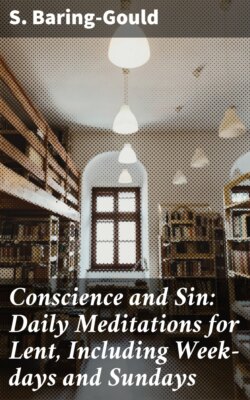Читать книгу Conscience and Sin: Daily Meditations for Lent, Including Week-days and Sundays - S. (Sabine) Baring-Gould - Страница 7
На сайте Литреса книга снята с продажи.
First Friday in Lent.
ОглавлениеTable of Contents
THE NATURE OF CONSCIENCE.
(Continued.)
1. Conscience, in the order of religious life, is that which the Court of Justice is in the order of public life, a court that has been instituted by the legislature to keep discipline and well-being in the State, to protect the individual in his person, his property, and his repute.
Thus Conscience takes the general laws of God and explains them in their bearings on our own conduct, and applies them to our several cases. Also, Conscience sees to the execution of the law—that it shall be obeyed as well as acknowledged. Also, Conscience punishes every infraction of the law.
In other words, Conscience is the interpreter of the law of God, it is the judge sitting in judgment on us for our observance or non-observance of the law, and it is the executioner carrying out the sentence against us. As interpreter, Conscience enlightens us as to the requirements of God, explains to us what is obscure, and smooths the way so that our wills, enlightened and ready to act without impediment, may take a direction one way or other.
An act does not become just or sinful till the will has consented to the advice of the Conscience as interpreter, or has turned against it and deliberately gone contrary to what it has laid down. Every wilful sin is therefore a determinate revolt against God.
2. But Conscience is more than interpreter, judge and executioner; it is also our accuser and the witness against us.
As accuser, it pursues the guilty everywhere, into the innermost recesses of the thoughts.
It sees clearly, it knows all the circumstances, it declares with unhesitating voice both what is the nature of the sin, and what is the condition of the sinner. Thus to the office of accuser it unites that of witness, presenting itself ever before the accused, with unshaken testimony. It has seen all; it has seen all as it is; and it has forgotten none of the circumstances.
As judge, it is enlightened with Divine illumination that pierces through all the mists of prejudice and clouds of passion, and nothing escapes from its vigilance.
As judge it is also severe, not easy and indifferent, for it has not its own law or humour to obey, but the divine law, which it interprets and administers.
It is just, for it stands in that position that it is between God, the Lawgiver, on one side, and man, who breaks that law, on the other. If it be inclined to over-leniency, if it be unjust, then Conscience is itself corrupted. But we are not now speaking of Conscience degraded, cajoled, bribed, and dishonest, but of the true Conscience as divinely illumined and divinely directed to judge aright. And as just and enlightened Conscience passes its judgment, and then takes up the office of executioner. “If,” says S. Paul, “we would judge ourselves we should not be judged.” That is to say, if we suffer our Consciences to perform their proper function here in the time of life, to pass sentence upon us justly, and execute the sentences passed, then there would be no second judgment for us at the last. That judgment is needed only because so many people refuse to permit Conscience to perform its divinely-ordained work here in this life.
Then consider Conscience as the executioner. It punishes man here, to work out his amendment. But if Conscience be not suffered to perform its divinely allotted task here, then it will do it in eternity when the time for amendment is over. That is the worm that dies not, that the fire that is never extinguished. Conscience is given to us as our executioner here in order to improve us, not to torture us unprofitably. It punishes us to work in us repentance. These are the two operations of Conscience as executioner.
